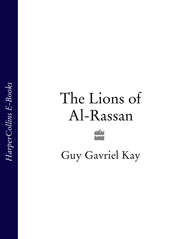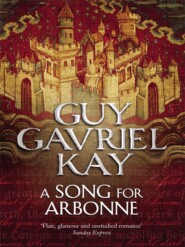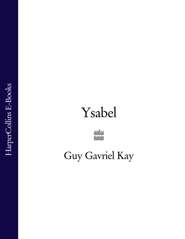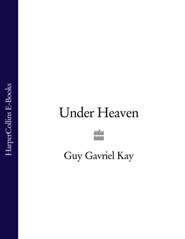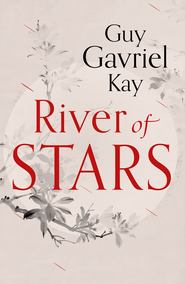По всем вопросам обращайтесь на: info@litportal.ru
(©) 2003-2025.
✖
Sailing to Sarantium
Автор
Год написания книги
2018
Настройки чтения
Размер шрифта
Высота строк
Поля
It didn’t seem in the least silly to Crispin. For the moment he deferred a reply. ‘I’ll get the gift,’ he said, and climbed down—jumping would lack all dignity—on the outside of the wall. He reclaimed the parcel from the grass, brushed some ants from it, and walked up the road towards the farmyard gate, breathing deeply to calm himself.
Zoticus was waiting, leaning on his staff, two large dogs beside him. He opened the gate and Crispin walked in. The dogs sniffed at him but heeled to a command. Zoticus led the way towards the house through a neat, small yard. The door was open, Crispin saw.
‘Why don’t we just eat him now?’
Crispin stopped. Childhood terror. The very worst kind, that made nightmares for life. He looked up. The voice was lazy, aristocratic, remembered. It belonged to a bird perched on the branch of an ash tree, not far from the doorway.
‘Manners, manners, Linon. This is a guest.’ Zoticus’s tone was reproving.
‘A guest? Climbing the wall? Stealing apples?’
‘Well, eating him would hardly be a proportionate response, and the philosophers teach that proportion is the essence of the virtuous life, do they not?’
Crispin, stupefied, fighting fear, heard the bird give an elaborate sniff of disapproval. Looking more closely, he abruptly realized, with a further shock, that it was not a real bird. It was an artifice. Crafted.
And it was talking. Or else . . .
‘You are speaking for it!’ he said quickly. ‘Casting your voice? The way the actors do, on stage sometimes?’
‘Mice and blood! Now he insults us!’
‘He is bringing a neckwarmer from Carissa. Behave, Linon.’
‘Take the neck thing, then let us eat him.’
Crispin, his own choler rising suddenly, said bluntly, ‘You are a construct of leather and metal. You can’t eat anything. Don’t bluster.’
Zoticus glanced quickly over at him, surprised, and then laughed aloud, the sound unexpectedly robust, filling the space before his doorway.
‘And that,’ he said, ‘will teach you, Linon! If anything can.’
‘It will teach me that we have an ill-bred guest this morning.’
‘You did propose eating him. Remember?’
‘I am only a bird. Remember? Indeed, I am less than that, it seems. I am a construct of leather and metal.’
Crispin had the distinct sense that if the small grey and brown thing with the glass eyes could have moved it would have turned its back on him, or flown away in disgust and wounded pride.
Zoticus walked over to the tree, turned a screw on each of the tiny legs of the bird, loosening their grip on the branch, and picked it up. ‘Come,’ he said. ‘The water is boiled and the mint was picked this morning.’
The mechanical bird said nothing, nestled in his free hand. It looked like a child’s toy. Crispin followed into the house. The dogs lay down in the yard.
THE INFUSION WAS GOOD, actually. Crispin, more calm than he’d expected to be, wondered if the old alchemist might have added something besides mint to it, but he didn’t ask. Zoticus was standing at a table examining the courier’s map Crispin had produced from the inner pocket of his cloak.
Crispin looked around. The front room was comfortably furnished, much as any prosperous farmhouse might be. No dissected bats or pots with green or black liquids boiling in them, no pentagrams chalked on the wooden floor. There were books and scrolls, to mark a learned and an unexpectedly well-off man, but little else to suggest magics or cheiromancy. Still, he saw half a dozen of the crafted birds, made of various materials, perched on shelves or the backs of chairs, and they gave him pause. None of these had spoken yet, and the small one called Linon lay silently on its side on a table by the fire. Crispin had little doubt, however, that any and all of them could address him if they chose.
It amazed him how calmly he accepted this. On the other hand, he’d had twenty-five years to live with the knowledge.
‘The Imperial Posting Inns, whenever you can,’ Zoticus was murmuring, head lowered still to the map, a curved, polished glass in one hand to magnify it. ‘Comforts and food are unreliable elsewhere.’
Crispin nodded, still distracted. ‘Dog meat instead of horse or swine, I know.’
Zoticus glanced up, his expression wry. ‘Dog is good,’ he said. ‘The risk is getting human flesh in a sausage.’
Crispin kept a composed face with some effort. ‘I see,’ he said. ‘Well spiced, I’m sure.’
‘Sometimes,’ said Zoticus, turning back to the map. ‘Be especially careful through Sauradia, which can be unstable in autumn.’
Crispin watched him. Zoticus had taken a quill now and was making notations on the map. ‘Tribal rites?’
The alchemist glanced up briefly, eyebrows arched. His features were strong, the blue eyes deep-set, and he wasn’t as old as the grey hair and the staff might have suggested. ‘Yes, that. And knowing they will be mostly on their own again until spring, even with the big army camp near Trakesia and soldiers at Megarium. Notorious winter brigands, the Sauradi tribes. Lively women, as I recall, mind you.’ He smiled a little, to himself, and returned to his annotations.
Crispin shrugged. Sipped his tea. Resolutely tried to put his mind away from sausages.
Some might have seen this long autumn journey as an adventure in itself. Caius Crispus did not. He liked his own city walls, and good roofs against rain, and cooks he knew, and his bathhouse. For him, broaching a new cask of wine from Megarium or the vineyards south of Rhodias had always been a preferred form of excitement. Designing and executing a mosaic was an adventure . . . or had been once. Walking the wet, windswept roads of Sauradia or Trakesia with an eye out for predators—human or otherwise—in a struggle to avoid becoming someone else’s sausage was not an adventure, and a greybeard’s cackling about lively women did not make it one.
He said, ‘I’d still like an answer, by the way, silly question or not. How did you know I was here all those years ago?’
Zoticus put down the quill and sat in a heavy chair. One of the mechanical birds—a falcon with a silver and bronze body and yellow jewelled eyes, quite unlike the drab, sparrow-like Linon—was fixed to the high back of the chair, screws adjusted so its claws held fast. It gazed inimically at Crispin with a pale glitter.
‘You do know I am an alchemist.’
‘Martinian said as much. I also know that most who use that name are frauds, hooking coins and goods from innocents.’
Crispin heard a sound from the direction of the fire. It might have been a log shifting, or not.
‘Entirely true,’ said Zoticus, unperturbed. ‘Most are. Some are not. I am one of those who are not.’
‘Ah. Meaning you know the future, can induce passionate love, cure the plague, and find water?’ He sounded truculent, Crispin knew. He couldn’t help it.
Zoticus gazed at him levelly. ‘Only the last, actually, and not invariably. No. Meaning I can sometimes see and do things most men cannot, with frustratingly erratic success. And meaning I can see things in men and women that others cannot. You asked how I knew you? Men have an aura, a presence to them. It changes little, from childhood to death. Very few people dare my orchard, which is useful—as you might guess—for a man living alone in the countryside. You were there once. I knew your presence again this morning. The anger in you was not present in the child, though there was a loss then, too. The rest is little enough altered. It is not,’ he said kindly, ‘so complicated an explanation, is it?’
Crispin looked at him, cupping his drink in both hands. His glance shifted to the jewelled falcon gripping the back of the alchemist’s heavy chair. ‘And these?’ he asked, ignoring the observations about himself.
‘Oh. Well. That’s the whole point of alchemy, isn’t it? To transmute one substance into another, proving certain things about the nature of the world. Metals to gold. The dead to life. I have learned to make inanimate substance think and speak, and retain a soul.’ He said it much as he might have described learning how to make the mint tea they were drinking.
Crispin looked around the room at the birds. ‘Why . . . birds?’ he asked, the first of fully a dozen questions that occurred. The dead to life.
Zoticus looked down, that private smile on his face again. After a moment, he said, ‘I wanted to go to Sarantium myself once. I had ambitions in the world, and wished to see the Emperor and be honoured by him with wealth and women and world’s glory. Apius, some time after he took the Golden Throne, initiated a fashion for mechanical animals. Roaring lions in the throne room. Bears that rose on their hind legs. And birds. He wanted birds everywhere. Singing birds in all his palaces. The mechanical artisans of the world were sending him their best contrivances: wind them up and they warbled an offkey paean to Jad or a rustic folk ditty, over and over again until you were minded to throw them against a wall and watch the little wheels spill out. You’ve heard them? Beautiful to look at, sometimes. And the sound can be appealing—at first.’
Crispin nodded. He and Martinian had done a Senator’s house in Rhodias.
‘I decided,’ said Zoticus, ‘I might do better. Far better. Create birds that had their own power of speech. And thought. And that these, the fruits of long study and labour and . . . some danger, would be my conduits to fame in the world.’
‘What happened?’
‘You don’t remember? No, you wouldn’t. Apius, under the influence of his Eastern Patriarch, began blinding alchemists and cheiromancers, even simple astrologers for a while. The clerics of the sun god have always feared any other avenues to power or understanding in the world. It became evident that arriving in the City with birds that had souls and spoke their own minds was a swift path to blinding if not death.’ The tone was wry.






